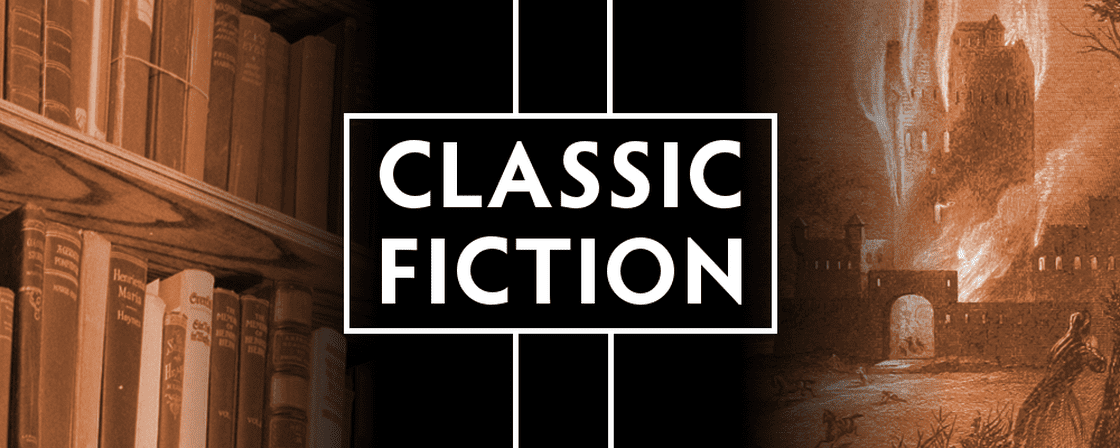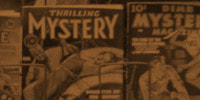|
Children will always be afraid of the dark, and men with minds sensitive to hereditary impulse will always tremble at the thought of the hidden and fathomless worlds of strange life which may pulsate in the gulfs beyond the stars, or press hideously upon our own globe in unholy dimensions which only the dead and the moonstruck can glimpse.
With this foundation, no one need wonder at the existence of a literature of cosmic fear. It has always existed, and always will exist; and no better evidence of its tenacious vigour can be cited than the impulse which now and then drives writers of totally opposite leanings to try their hands at it in isolated tales, as if to discharge from their minds certain phantasmal shapes which would otherwise haunt them. -- H. P. Lovecraft, Supernatural Horror in Literature (1927)
|
It is impossible to understand alternative archaeology and the occult without understanding the fiction that grew up alongside and intertwined with it. The interconnection between science, pseudoscience, the supernatural, and archaeology finds its clearest expression in speculative fiction, where ancient horrors rise up from the deep past and supernatural or extraterrestrial forces threaten humankind. Classic works of fiction like these helped to define the web of connections that make up the alternative archaeology and fringe science movements, for such speculative theories proved fertile sources for fictional plots, and the fictional stories carried speculative ideas forward across the centuries to new generations that might otherwise have never heard of them.
|
THE TRUE HISTORY
Lucian (2nd c. CE) "[The] attraction [of my book] is in the veiled reference underlying all the details of my narrative; they parody the cock-and-bull stories of ancient poets, historians, and philosophers; I have only refrained from adding a key because I could rely upon you to recognize as you read." |
|
SOME WORDS WITH A MUMMY
Edgar Allan Poe (1845) "Removing the third case, we discovered and took out the body itself. We had expected to find it, as usual, enveloped in frequent rolls, or bandages, of linen; but, in place of these, we found a sort of sheath, made of papyrus, and coated with a layer of plaster, thickly gilt and painted." |
|
THE COMING RACE
Edward Bulwer-Lytton (1871) "Through one of these doorways I was conducted into a chamber fitted up with an oriental splendour; the walls were tesselated with spars, and metals, and uncut jewels; cushions and divans abounded; apertures as for windows but unglazed, were made in the chamber opening to the floor..." |
|
KING SOLOMON'S MINES
H. Rider Haggard (1885) "...the people who lived across those mountains were a "branch" of the Zulus, speaking a dialect of Zulu, but finer and bigger men even; that there lived among them great wizards, who had learnt their art from white men when 'all the world was dark,' and who had the secret of a wonderful mine of 'bright stones.'" |
|
AN INHABITANT OF CARCOSA
Ambrose Bierce (1886) "I observed in the herbage a number of weatherworn stones, evidently shaped with tools. They were broken, covered with moss and half sunken in the earth. Some lay prostrate, some leaned at various angles, none was vertical. They were obviously headstones of graves..." |
|
THE XIPÉHUZ
J.-H. de Rosny aine (1887) "...A phantasmagorical sight revealed itself to the nomads. They first saw a large circle of cones—bluish, translucent, apex upwards—each in volume about half the size of a man. A few bright lines and some rings of dark color dotted their surface, and all had at their base a dazzling star-shaped aperture...." |
|
LOT NO. 249
Sir Arthur Conan Doyle (1892) "The blotched skin was drawn tightly from bone to bone, and a tangled wrap of black, coarse hair fell over the ears. Two thin teeth, like those of a rat, overlay the shrivelled lower lip. In its crouching position, with bent joints and craned head, there was a suggestion of energy about the horrid thing which made Smith's gorge rise." |
|
THE NOVEL OF THE BLACK SEAL
Arthur Machen (1895) "...for the first time my astonishment was mingled with a sudden note of terror, arising I knew not whence, and all unexplained even to myself, and yet I felt about my heart for an instant something of the chill of death, and that shapeless, formless dread of the unknown that is worse than death itself." |
|
THE ISLAND OF DOCTOR MOREAU
H. G. Wells (1896) "...I did not, however, mean to die, and an incident occurred that warned me unmistakably of the folly of letting the days pass so,—for each fresh day was fraught with increasing danger from the Beast People..." |
|
PHARAOH'S CURSE
Lucian Sorrel (1897) "'The curse is killing me! The curse is killing me!' he shrieked, as we entered the room. 'Cut off my arm—tear the wound out! It burns, it burns!' the poor wretch screamed in his agony, writhing with pain until the bedstead shook beneath his weight; and trying himself to pluck the flesh from the injured limb." |
|
EDISON'S CONQUEST OF MARS
Garrett P. Serviss (1898) "Here, then, was the explanation of how those gigantic blocks that constitute the great Pyramid of Cheops had been swung to their lofty elevation. It was not the work of puny man, as many an engineer had declared that it could not be, but the work of these giants of Mars." |
|
THE LOST CONTINENT
C. J. Cutcliffe Hyne (1899) "One look I took at the image of the Goddess before I left the temple. The jet of earth-breath which burns eternally from the central altar lit her from head to toe, and threw sparkles from the great jewel in her forehead. Vast she was, and calm and peaceful beyond all human imaginings..." |
|
COUNT MAGNUS
M. R. James (1904) "The monuments, mostly large erections of the seventeenth and eighteenth centuries, were dignified if luxuriant, and the epitaphs and heraldry were copious. The central space of the domed room was occupied by three copper sarcophagi, covered with finely-engraved ornament." |
|
THE MYSTERIOUS STRANGER
Mark Twain (1908) "And you are not you—you have no body, no blood, no bones, you are but a thought. I myself have no existence; I am but a dream—your dream, creature of your imagination. In a moment you will have realized this, then you will banish me from your visions and I shall dissolve into the nothingness out of which you made me...." |
|
THE WENDIGO
Algernon Blackwood (1910) "It's nuthin'—nuthin' but what those lousy fellers believe when they've bin hittin' the bottle too long—a sort of great animal that lives up yonder," he jerked his head northwards, "quick as lightning in its tracks, an' bigger'n anything else in the Bush, an' ain't supposed to be very good to look at—that's all!" |
|
THE LOST WORLD
Sir Arthur Conan Doyle (1912) "No; a reptile—a dinosaur. Nothing else could have left such a track. They puzzled a worthy Sussex doctor some ninety years ago; but who in the world could have hoped—hoped—to have seen a sight like that?" |
|
THE RED ONE
Jack London (1918) "...likewise had he beheld the phosphorescence of fungoid growths and rotten meat and fireflies on dark nights, and the flames of wood-fires and of blazing candle-nuts; yet what were flame and blaze and glow when they had flamed and blazed and glowed?" |
|
SPECIAL COLLECTION: H. P. LOVECRAFT
"Dagon," "The Call of Cthulhu," and At the Mountains of Madness "I know not why my dreams were so wild that night; but ere the waning and fantastically gibbous moon had risen far above the eastern plain, I was awake in a cold perspiration, determined to sleep no more. Such visions as I had experienced were too much for me to endure again." |
|
THE SKEPTICAL POLTERGEIST
J.D. Beresford (1919) "I planned an intensive study of the works of the later Victorians, of that blissful period in the history of Europe when we could believe in the comforting doctrine of materialism. 'Oh!' I thought, 'that one had a Haeckel or a Huxley living now to console us with their beautiful faith in the mortality of the soul!'" |
|
THE CORPSE ON THE GRATING
Hugh B. Cave (1930) In the gloomy depths of the old warehouse Dale saw a thing that drew a scream of horror to his dry lips. It was a corpse—the mold of decay on its long-dead features—and yet it was alive! |
|
THE SECOND SATELLITE
Edmond Hamilton (1930) Earth-men War on Frog-vampires for the Emancipation of the Human Cows of Earth's Second Satellite. |
|
QUEEN OF THE BLACK COAST
Robert E. Howard (1934) A weird story of Conan the barbarian and a savage white woman who captained a pirate ship, and a ghastly horror in the jungle. |
|
A MARTIAN ODYSSEY
Stanley G. Weisbaum (1934) "Dick Jarvis was chemist of the famous crew, the Ares expedition, first human beings to set foot on the mysterious neighbor of the earth, the planet Mars." |








